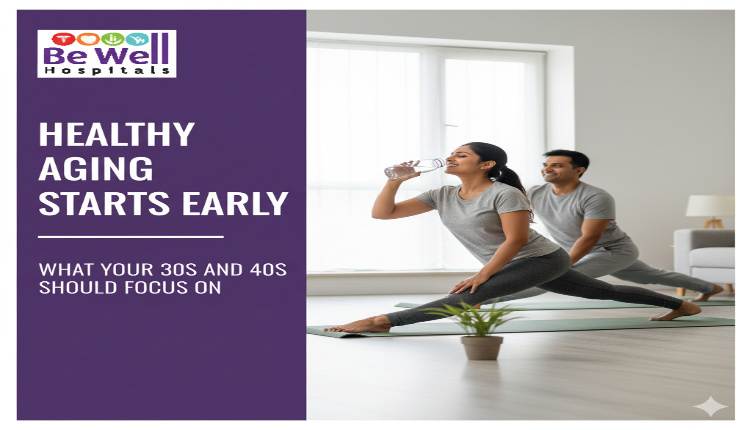
Aging Well Isn’t About Looking Young – It’s About Staying Strong
Most people think about “aging” only when wrinkles show or joints start to ache. But aging doesn’t begin at 60 – it begins quietly in your 30s and 40s, when your lifestyle starts shaping how well you’ll live later.
The choices you make now – about food, stress, sleep, and movement – decide whether your 50s and 60s will be filled with energy or fatigue.
The good news? You can age well by starting early.
Why Your 30s and 40s Are the Real Turning Point
These are the decades when life feels busiest – career peaks, family responsibilities, limited time for yourself. That’s also what makes them critical for long-term health.
Your metabolism begins to slow, muscle mass starts to decline slightly, and stress quietly builds up. These changes aren’t dramatic, but ignoring them can make the later years harder.
Starting preventive care early means you stay in control – not just of how long you live, but how well you live. Some key Health Areas to Focus On
- Prioritize Movement, Not Just Exercise
You don’t need a gym obsession; you need consistency.
Try this simple rule: move every hour, exercise 4–5 times a week, and include both strength and flexibility.
Strength training helps preserve muscle and bone health, while daily movement supports circulation and mood.
- Protect Your Sleep
Your body does its deepest repair during sleep – from hormone balance to memory consolidation.
Late nights and erratic schedules might feel manageable now, but over time, they compound into stress, fatigue, and health issues.
Set a regular sleep rhythm. Treat it as seriously as meetings or workouts.
- Eat for Energy, Not Restriction
Your 30s and 40s aren’t about dieting – they’re about nourishment.
Focus on:
More whole foods and fiber
Less processed sugar and fried snacks
Balanced meals with protein and good fats
Hydration as a daily goal
Think of food as daily maintenance, not just fuel.
- Keep Stress in Check
Stress is subtle but powerful. It influences everything – digestion, immunity, even how your body stores fat.
Learn to pause. Take short breaks, go for a walk, or practice breathing exercises. Mental rest is as important as physical rest.
- Build Preventive Health Habits
This is the decade to shift from “I’ll go to the doctor when I’m sick” to “I’ll stay ahead of my health.”
Get annual health checks – blood sugar, cholesterol, thyroid, vitamin levels – even if you feel fine.
Catching small imbalances early is what keeps you feeling young longer.
- Guard Your Mind and Relationships
Emotional health is the foundation of graceful aging.
Stay curious, keep learning, nurture friendships, and engage in hobbies.
Social connection and a sense of purpose protect your brain and mood far more than we realize.
What You Do Now Shapes the Next 30 Years

Here’s the thing – aging well isn’t about reversing time; it’s about respecting it.
You can’t control the years, but you can control what those years do to your body and mind.
Every healthy choice today is a small investment that pays lifelong returns – better mobility, sharper thinking, and deeper joy.
Key Takeaways
Healthy aging begins in your 30s and 40s – not after retirement.
Focus on movement, sleep, nutrition, and stress balance.
Prevention and consistency matter more than perfection.
A strong body and calm mind in midlife make for a confident, energetic later life
Start now. Book your annual health check, reset your routine, and make small daily choices that your future self will thank you for.
Because aging well doesn’t happen by chance – it happens by choice.
